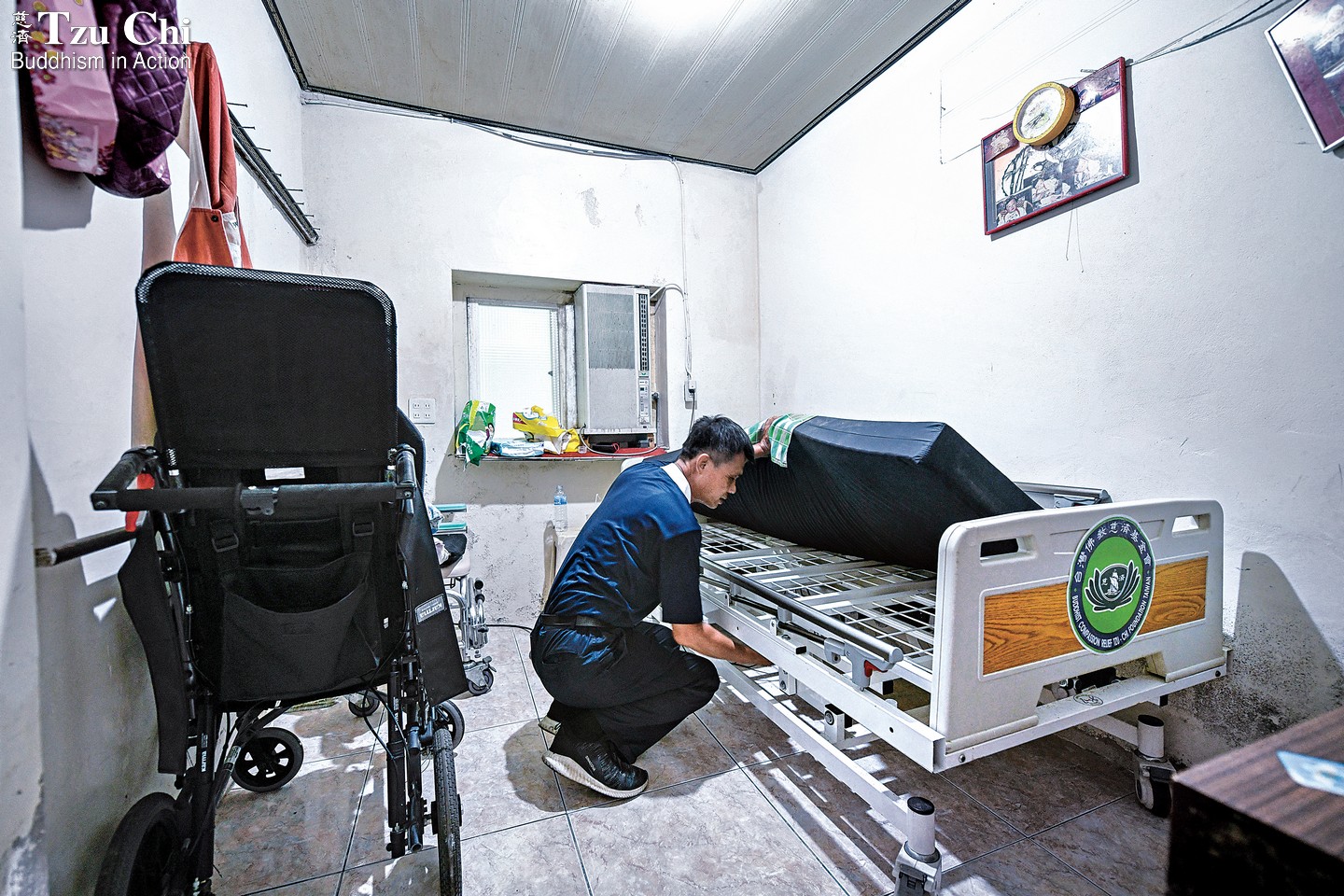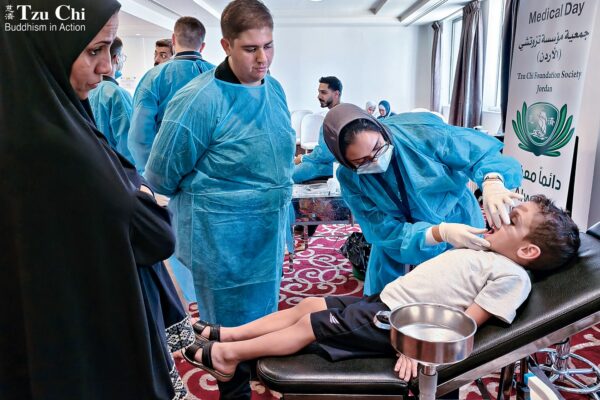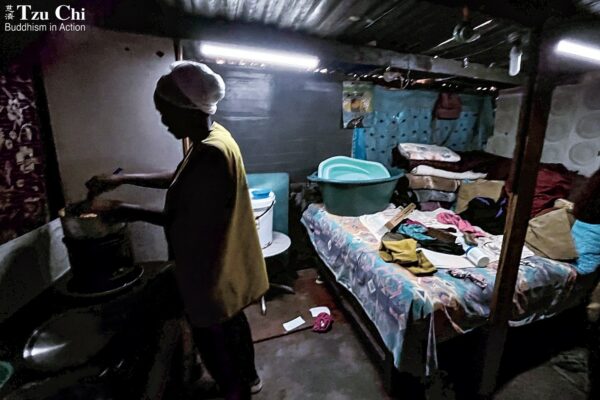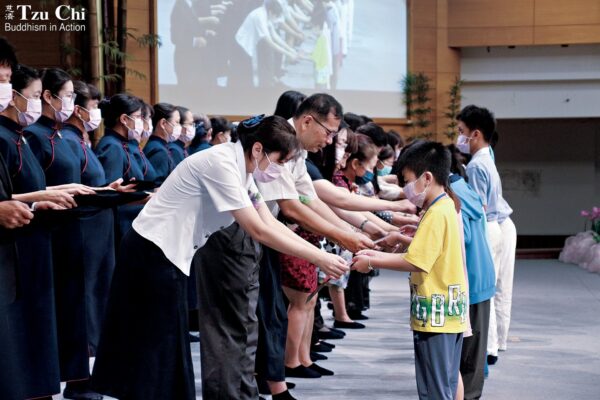By Chen Jin-guo
Translated by Wu Hsiao-ting
Photo by Yan Lin-zhao
Obstacles couldn’t deter these determined volunteers from bringing relief to an ALS patient on a remote offshore island.

Volunteer Xu Wen-hu visited Mr. Chen’s home again in August 2023 to check if the electric bed provided by Tzu Chi was working well.
I’m a Tzu Chi volunteer based in Hualien, eastern Taiwan. Recently, a story shared during a Tzu Chi study group session deeply resonated with me.
Brother Xu Wen-hu (許文虎) is a fellow volunteer residing in Magong on the main island of Penghu, an archipelago off the southwestern coast of Taiwan. His mother was diagnosed with dementia, so a foreign caregiver was hired to aid in her daily care. In October 2022, this caregiver learned about Tzu Chi’s assistive device program from Xu and promptly informed him about a fellow Indonesian providing care for a patient with ALS (also known as Lou Gehrig’s disease) on Niao Islet, an offshore island of Penghu. The caregiver described the challenges faced by her petite compatriot: the ALS patient she cared for was a large and sturdy man, and the lack of assistive equipment made tasks like changing his clothes or assisting with his bathing very difficult. She inquired if Tzu Chi could offer help in this situation.
Xu himself is a member of the Tzu Chi assistive device team in Penghu. He is well aware of the lack of medical resources on a remote island like Niao Islet. He also understands the inconveniences confronting bedridden patients without assistive equipment like an electric bed. Despite the formidable northeasterly winds and turbulent seas typical of Penghu in October, he decided to brave the 50-minute boat trip from Magong to Niao Islet to visit the ALS patient for an assessment.
When Xu arrived at the home of the patient, whose last name was Chen, he discovered that he had been bedridden for some time. Mr. Chen’s traditional wooden bed was clearly too low and not conducive to his care. Xu spoke with Mr. Chen’s father and suggested switching to an electric bed. He also recommended replacing Mr. Chen’s standard wheelchair with a high-back one and providing a wheeled commode chair for easier movement into the bathroom for a shower. The elderly father was very thankful for Xu’s thoughtfulness and couldn’t stop expressing his gratitude.
The electric bed was very heavy, weighing over a hundred kilograms (220 pounds). Transporting it from the main island of Penghu to Niao Islet required careful consideration of weather conditions. Since fishermen have a better understanding of sea conditions, Xu asked Mr. Chen’s father, a fisherman, to notify him in advance when the weather was stabilizing to facilitate transportation arrangements.
The sea conditions remained harsh for days following Xu’s visit, then stretched to weeks. Xu was impatient for the weather to improve. Finally, on November 9, Xu received a call from Mr. Chen’s father indicating that the weather was about to get better. Xu immediately arranged logistics, and on November 11, accompanied by volunteers Cai You-ren (蔡有仁) and Lu Qiong-lang (呂瓊郎), he took the 11 a.m. ferry to Niao Islet. The assistive equipment they were bringing for Mr. Chen was entrusted to a cargo boat for delivery.
They approached Niao Islet about 50 minutes later. As their boat drew near, they saw Mr. Chen’s father waiting at the harbor, observing their ferry’s gradual approach. Things were progressing smoothly and they were happy. Little did they know that the real challenges were just about to begin.
Doorway dilemma
When they arrived at Mr. Chen’s home with the electric bed, the volunteers discovered that, no matter how they turned it, it wouldn’t fit through the front door. Thankfully, they had all the necessary tools they needed, so they immediately set to work removing the front door. That allowed them to bring the bed into the house. Then they discovered the bedroom door through which they had to carry the bed was too small too. They ended up taking that door off like before, but even after this step, the bed still wouldn’t fit. The volunteers eventually had to disassemble the electric bed itself, carry it through the door in pieces, then reassemble it once inside the room.
After testing the reassembled bed and making sure it worked, the volunteers showed Mr. Chen’s father and the foreign caregiver how to operate it. A rare smile appeared on the father’s face when he got the hang of the controls. He insisted on treating the volunteers to lunch to express his gratitude. The volunteers politely declined, explaining that they wanted to visit the village chief and the local health center to promote Tzu Chi’s assistive device services before their ferry left at 2 p.m.
Leaving the Chens’ home, the group proceeded to the village chief’s residence and the health center. After delivering their messages, Cai You-ren bought bread from a nearby store for their lunch. Upon returning to the harbor, they were surprised to find Mr. Chen’s father there. He had come to the harbor once again to express his gratitude and bid farewell to the volunteers. The sincere father’s words were simple and straightforward, as he repeated “thank you” again and again to the volunteers.
Dharma Master Cheng Yen teaches that no goal is unattainable if one has a determined mind, and that nothing is impossible with diligent action. Volunteers Xu, Cai, and Lu epitomize these principles, illustrating that where there is a will, there is a way, and that every difficulty is temporary. Their inspiring story resonates as a testament to the power of compassion and an unwavering determination to aid the underserved.



